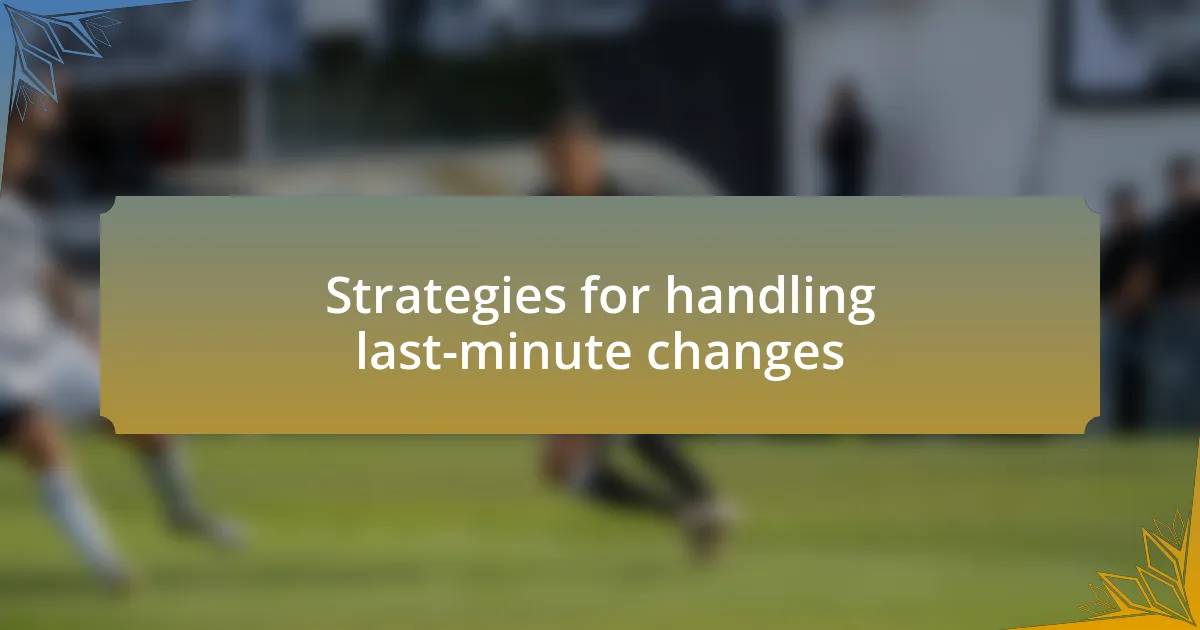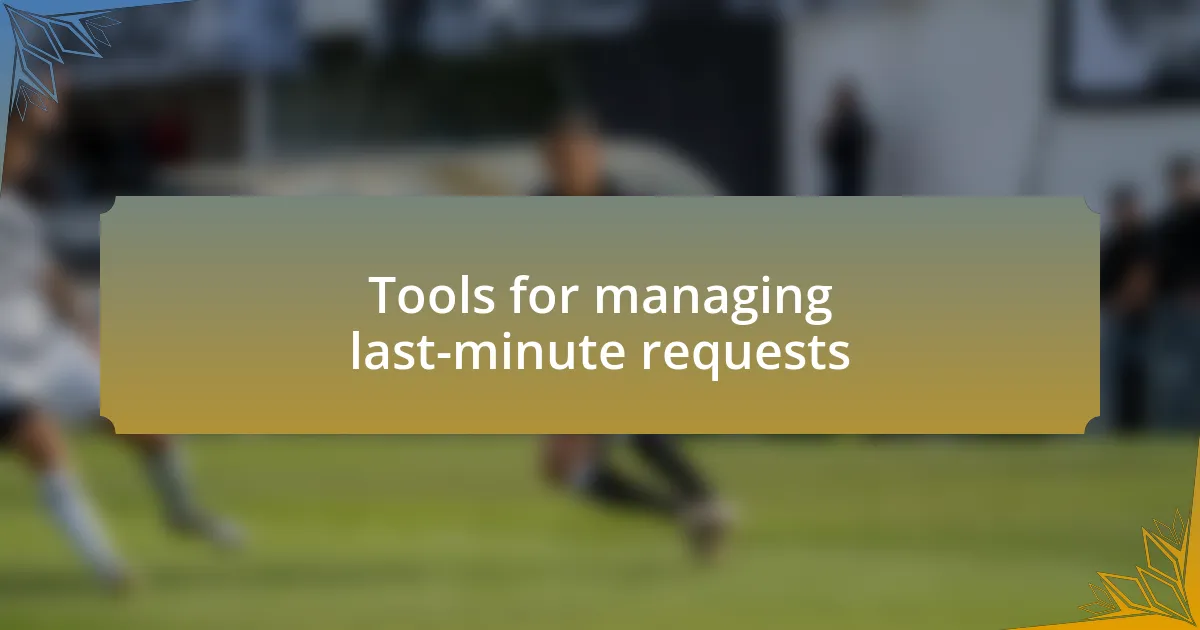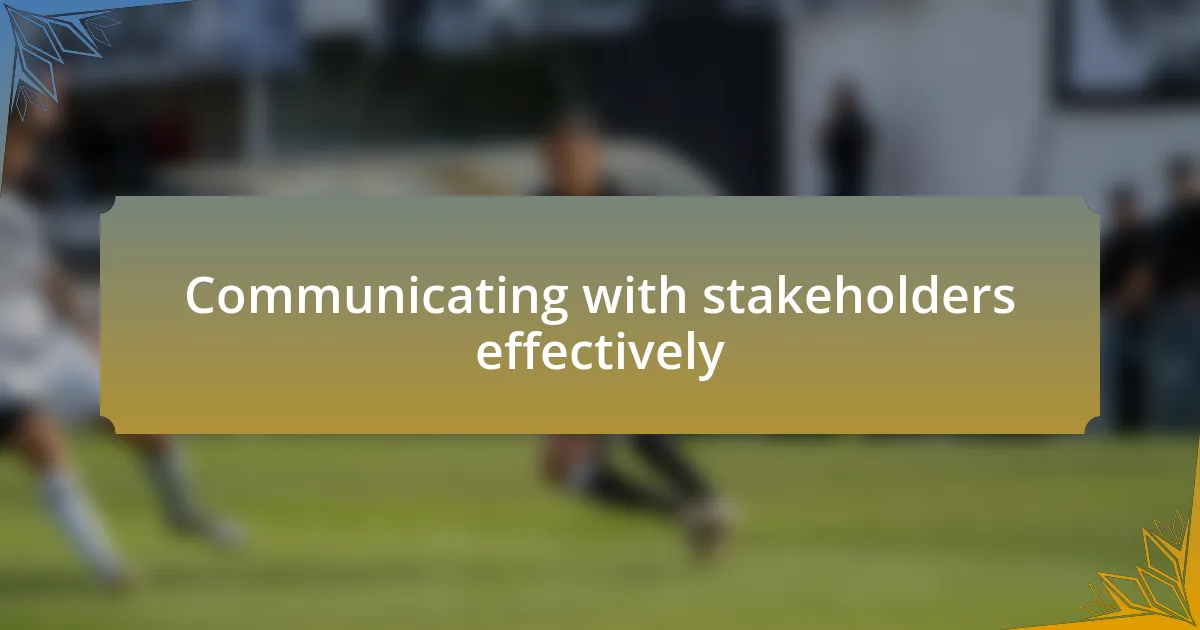Key takeaways:
- Flexibility is essential in event planning as last-minute changes can create unexpected opportunities for improvement.
- Customer experience significantly impacts overall satisfaction and loyalty, highlighting the importance of every interaction.
- Effective communication and collaboration tools are vital for managing last-minute requests and changes among team members and stakeholders.
- Stress management techniques, such as breathing exercises and connecting with colleagues, can help maintain clarity and morale during hectic times.

Understanding last-minute changes
Last-minute changes can be quite a whirlwind, can’t they? I remember a particular conference I organized where we had to shift a speaker’s slot just a few hours before the event. The tension in the planning room was palpable, but it taught me that flexibility is key. Each change can bring unexpected opportunities for improvement.
When we’re faced with sudden changes, it’s easy to feel overwhelmed and anxious. I often find myself asking, “What could have been done differently?” This reflection helps me pinpoint areas for better preparation in the future. Embracing these last-minute adjustments can foster creativity and lead to innovative solutions that might not have emerged otherwise.
Understanding the reasons behind these changes is crucial, especially in a live event setting. Whether it’s a cancellation or a late-breaking update, I’ve come to realize that staying calm and keeping a clear head allows us to pivot quickly. It’s all about maintaining a focus on what’s most important: creating a positive experience for the attendees.

Importance of customer experience
Customer experience isn’t just a buzzword; it’s the heartbeat of any event. Once, during a customer experience conference, I saw firsthand how the ambiance of the venue transformed when attendees felt welcomed. That day, the simple act of a warm greeting from the staff made a lasting impression. It highlighted for me that every interaction shapes how customers perceive an experience.
Now, think about how you feel when you encounter poor customer service. Frustrating, right? I remember a time when I dealt with a tech support team that left me disheartened. The lack of empathy created a significant dent in my overall satisfaction, reminding me that a negative experience can overshadow even the best-laid plans. This reinforces the idea that every touchpoint matters in crafting a memorable customer journey.
In my opinion, effective customer experience can drive loyalty and positive word-of-mouth. I often reflect on conversations I’ve had with attendees after a successful event—they’re not just excited about the sessions; they appreciate how they felt valued. This connection is what we should strive for, as it’s clear that positive experiences lead to repeat attendance and community development. Wouldn’t you agree that a little attention can go a long way?

Common last-minute changes in events
Sometimes, last-minute changes are inevitable, especially in the fast-paced environment of event planning. I once had an experience where a keynote speaker canceled the night before a major conference. It was nerve-wracking, but I quickly reached out to an engaging local expert who was willing to step in. This taught me that having a backup list of potential speakers can be a lifesaver.
Another common change involves logistics, such as venue adjustments. I remember a rainy day when our outdoor networking session had to be shifted indoors. Although it seemed like a setback, we transformed a cramped space into an intimate gathering spot, which ultimately fostered deeper connections among attendees. It’s moments like these that remind me that flexibility can turn challenges into opportunities.
Technical glitches are also a frequent last-minute hurdle. I once faced a situation where the AV equipment malfunctioned just before the first session. Rather than letting panic set in, I rallied the team to troubleshoot quickly, and we managed to find a solution in record time. This experience reinforced my belief that a calm and collaborative approach can significantly enhance the overall event atmosphere, even when things go awry. How do you prepare for the unexpected at your events?

Strategies for handling last-minute changes
One effective strategy I’ve found for handling last-minute changes is maintaining open communication with your team and stakeholders. I recall an instance where vendor availability changed unexpectedly just days before a conference. By keeping a group chat active, we facilitated quick discussions, enabling us to realign our plans almost immediately. How often do you check in with your team during crunch time?
Another approach involves prioritizing flexibility in your planning. I vividly remember when a major transportation issue arose, affecting many attendees’ arrivals. Instead of stubbornly sticking to the original agenda, we quickly adapted by hosting an informal meet-and-greet session at a nearby café. By being open to spontaneous changes, we not only alleviated stress but also boosted attendee engagement, creating a unique experience. Have you considered the benefits of spontaneity in your event planning?
Lastly, always have a contingency plan for crucial elements like technology or speakers. During a particular workshop, the main presenter fell ill at the last minute. Luckily, I had cultivated relationships with other industry professionals, and I swiftly recruited a backup, who delivered a fantastic session. This experience highlighted for me the importance of preparation but also the joy that can come from unexpected collaborations. What backup strategies do you have in place for your events?

Tools for managing last-minute requests
When it comes to managing last-minute requests, I find that utilizing project management tools can be a game changer. For instance, when I faced a last-minute venue change, I turned to Trello to quickly assign tasks and deadlines to my team. It allowed everyone to see real-time updates, which kept us organized and on the same page. Have you ever used such tools to enhance team collaboration under pressure?
Another invaluable tool I’ve used is communication platforms like Slack. During another hectic event planning phase, an urgent request to update the event schedule came in late at night. By creating a dedicated channel for urgent tasks, we not only streamlined our communication but also fostered a sense of camaraderie among team members tackling the pressure together. How do you ensure that everyone is aligned during those high-stress moments?
Lastly, I’ve found that leveraging cloud-based document-sharing platforms, like Google Drive, is essential for quick access to important files and updates. I recall a scenario where a last-minute sponsorship proposal needed to be tailored; having shared access to a document allowed my team and I to work collaboratively, even from different locations. It’s these tools that can turn a last-minute panic into a well-orchestrated response. What tools do you rely on for seamless collaboration during those frantic hours?

Communicating with stakeholders effectively
Effective communication with stakeholders is crucial, especially when last-minute changes arise. I remember a time when a key speaker canceled just days before a conference. I decided to gather everyone involved, from the marketing team to event coordinators, for a quick brainstorming session. It was amazing how a simple face-to-face conversation transformed anxiety into a collaborative energy, pulling us together and allowing for creative solutions.
During that same situation, I learned the importance of ongoing updates. Keeping stakeholders informed regularly alleviated concerns and fostered trust. For instance, I created a shared document that tracked our progress, which not only highlighted our efforts but also welcomed feedback and suggestions. Have you ever felt the relief of simply being kept in the loop? It can make a world of difference.
I often think about the emotional aspect of communication during chaotic times. When everyone is stressed, I like to incorporate a bit of humor in my messages, which lightens the mood and brings a sense of unity. I once sent out a lighthearted poll asking everyone to choose a superhero that best represented their role in the last-minute scramble. It not only engaged everyone but reminded us that we were all in this together, fighting to deliver an exceptional experience. How do you keep spirits high when the pressure mounts?

Personal tips for managing stress
When stress starts creeping in, I’ve found that taking a moment to breathe can work wonders. I remember one particularly hectic day before a conference when deadlines were piling up. Instead of charging ahead, I stepped outside for five minutes, inhaled deeply, and focused on the sounds around me. That brief pause was all I needed to regain my clarity and approach the tasks with renewed energy. Have you ever experienced the power of a simple breath?
Setting small, achievable goals is another strategy that has helped me tremendously. During another last-minute scramble, I jotted down three main tasks I needed to tackle rather than viewing the entire mountain of work ahead. This bite-sized approach made everything feel more manageable, allowing me to check items off the list and build momentum. Doesn’t it feel satisfying to see tangible progress, even on the most chaotic days?
Lastly, connecting with colleagues during stressful moments has been invaluable. I often reach out for a quick chat about non-work-related topics, which serves as a wonderful mental reset. One time, a co-worker and I took a five-minute coffee break to discuss our favorite TV shows. It took our minds off the pressure and reminded us that we are not just coworkers but people navigating challenges together. How often do you take a moment for connection amidst the rush?